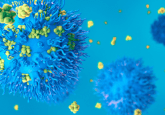Fermented foods: activating the immune system

The mechanism by which lactic acid bacteria, frequently found in fermented foods, activates the immune system has been established in a recent study.
A group of bacteria frequently involved in the fermentation of foods, known as lactic acid bacteria, have been associated with health benefits when consumed. The mechanism for these benefits, however, are poorly understood, particularly the association with our immune systems.
That is, of course, until recently when Claudia Stäubert (University of Leipzig; Germany), leading a team of colleagues, identified the fact that humans and great apes have cellular receptors that detect the metabolites of these lactic acid bacteria, triggering the mobilization of immune cells, such as monocytes.
“…we believe it could serve as a potential drug target to treat inflammatory diseases.”
The researchers were primarily focused on the study of hydroxycarboxylic acid (HCA) receptors, found in the cellular membrane. The study focused on the fact that monocytes from humans and great apes contain a HCA receptor type additional to the standard two variations present in the majority of animals. This more coveted receptor was found to bind D-phenyllactic acid, a lactic acid bacteria metabolite, which signals the presence of the bacteria to the immune system.
The authors of the paper, published in PLoS Genetics, suggest that this interaction was established at some point in our evolutionary history between the evolution of hominids from other mammals in order to signal the presence of lactic acid bacteria in foods. This provides a clear signal for foods that are beginning to decay, and so the activation of the immune system at these times would impart a clear survival advantage.
-
Can a high-fiber diet lead to a better immunotherapy response?
-
Human gut microbiome’s link to depression
-
Could anxiety be relieved by changing your diet?
Discussing the implications of the study results Stäubert stated that, “we are convinced that this receptor very likely mediates some beneficial and anti-inflammatory effects of lactic acid bacteria in humans. That is why we believe it could serve as a potential drug target to treat inflammatory diseases.”
The next step for the research team is to examine D-phenyllactic acid and its interactions with the immune system. Further study will also be required into the acid’s effects on other cell types that contain the third HCA type, such as adipocytes cells in lung and skin organs. Ultimately, the potential for these bacteria to provide a clinically viable anti-inflammatory effect leads to the very exciting prospect of possible changes in diet that could lead to a beneficial treatment for conditions of chronic inflammation.





